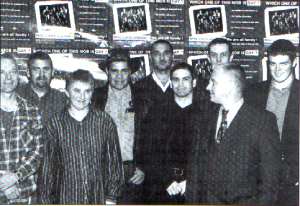 They made history, these two groups, on a rainy day in May 1997 at the Eora Centre in Sydney's Chippendale. And I they made it in the simplest, most significant way: a mutual expression of support and respect. Aboriginal and Torres Strait lslander Social Justice Commissioner, Mick Dodson, took the podium first. Speaking in the context of ensuring equal rights for all Australians, he launched a poster campaign promoting acceptance of homosexuals within Indigenous communities. Representatives of four Sydney lesbian and gay community organisations followed, to share the reading of a statement in support of Reconciliation with Australia's Indigenous peoples. Groups represented at the reading were the AVP, 2010 Lesbian and Gay Youth Services, the PRIDE organisation and the NSW Gay and Lesbian Rights Lobby. AVP coordinator, Bruce Grant, said the organisation had long recognised the link between racist and homophobic behaviour. "The gay and lesbian community has often called un the support of other communities in its own fight for equal rights," said Grant. "Now it's time for us, as lesbians and gay men, to show that we also support social justice for everyone, including Indigenous Australians." Dodson said he was pleased the lesbian and gay community had come out in support of Reconciliation. But he admitted homophobia among Aborigines and Torres Strait lslanders also had to be addressed. "Sadly, the level of intolerance [of homosexuals] in the Indigenous community is probably on a par with the rest of the community," he said. "I can't say there's total tolerance anywhere." Dodson said the posters would go out to ATSI youth and health centres around NSW, as well as Indigenous community centres and some schools. Following the launch, each participating lesbian and gay organisation sent copies of the Reconciliation Statement to its members. The groups will now collect feedback before tabling recommendations on how to ensure Indigenous Australians are properly served by each organisation. Grant said the next step is to hold a public consultation before drafting a community Reconciliation Statement. Suggestions from individuals have so far included smoothing the way [or Indigenous gays and lesbians to serve in decision-making positions within community organisations, as well as holding ATSI-targeted events. The PRIDE Centre has already held a successful Corroboree function its Surry Hills headquarters, while Sydney Gay and Lesbian Mardi Gras has a standing committee on Indigenous issues and plans special events for next year's Festival. Aboriginal and Torres Strait Islander Commission manager of public affairs, Aaron Ross, has been involved with the lesbian and gay community Reconciliation process since its inception. He said: "What I see Reconciliation about is people with power and privilege accepting they have to share it - and they have to share it with us." Ross said for the Reconciliation process to work, the initiatives put into place in the lesbian and gay community had to be ongoing and sustainable. 2010 coordinator Ross Bennett added: "Gays and lesbians and Aboriginals and Torres Strait Islanders experience [similar] discrimination, and that's the common ground for us. And that's why we're going to be able to progress, because there's real understanding of the grassroots ways to ensure that everyone gets to participate [in society] on equal terms." On July 10, a public meeting was held to solicit feedback about the Reconciliation Statement from lesbian and gay community members. Around 50 people attended the meeting in the lesbian and gay PRIDE Centre in Surry Hills, where the statement was circulated and discussed. No objections to the wording of the statement being recorded, the group split into workshops where responses at a personal, organisational and community level were discussed. From there, a 12-member Community Committee was established to continue planning the gay and lesbian reconciliation strategy. KooriVoice - Winter 1997 If your
organisation would
like copies of
the Reconciliation
Statement,
|
| Other AVP initiatives:
Talking our Language First Australians launch an Australian first Homophobia: What are you scared of? |
